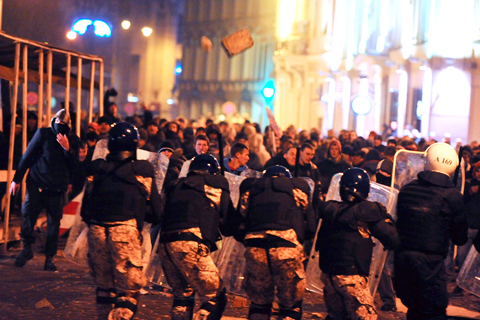Latvia’s president lashed out at lawmakers and threatened to dissolve parliament after more than 40 people were injured in the worst rioting since the Baltic country split from the Soviet Union in 1991.
Latvian President Valdis Zatlers said on Wednesday he would disband the legislature by March 31 unless lawmakers agree to a series of reforms to help restore political and economic order in the crisis-hit nation.
Latvia’s economy was once the fastest-growing in the EU, but it has undergone a dramatic reversal and is expected to contract 5 percent this year. The central bank burned through about one-third of its reserves to defend the currency, and unemployment rocketed from 6 percent to 7 percent last month.

PHOTO: AFP
International lenders including the EU, the IMF and Nordic countries have pledged US$10.5 billion in financial assistance to help the nation of 2.3 million recover.
Zatlers’ ultimatum came a day after an anti-government demonstration that included an estimated 10,000 participants turned violent when scores of angry protesters tried to storm parliament and clashed with police.
More than 40 people were injured, mostly protesters, but also six police officers and eight military police, Latvian interior ministry spokeswoman Sigita Pildava said. Police detained 106 people.
The rampage echoes similar clashes in Greece and Bulgaria, where protesters vented their anger at deteriorating economic conditions and widespread corruption.
In Latvia, government and opposition leaders blamed each other for the violence, but Zatlers said politicians must address “the catastrophic collapse of trust in authorities and state officials” that was expressed at the demonstration.
His ultimatum surprised many in the Baltic state considering the current coalition placed him in the president’s chair. In Latvia, the president is elected by parliament.
Latvians are irate about the country’s deepening recession, and many blame Prime Minister Ivars Godmanis’ center-right government for the economic woes.
Zatlers demanded lawmakers amend the Constitution to give voters the right to dissolve the legislature between elections and called for the creation of a council to oversee Latvia’s economic recovery program.
He also told Godmanis that his Cabinet had to restructure the way the government works, including minimizing the number of ministerial posts.
“Both parliament and the government have lost touch with voters,” Zatlers told reporters.
The violence started as a peaceful anti-government demonstration ended in Riga’s historic Old Town. Most of the demonstrators left the area but about 100 of them turned violent and tried to storm the parliament building. Riot police kept them away, using tear gas and truncheons.
The rioters pelted officers with cobblestones and chunks of ice and vandalized three police vehicles. They smashed windows of boutiques, the finance ministry and a bank, and looted a liquor store.
Godmanis told the LNT TV station on Wednesday that protest organizers bear responsibility for the violence, citing their decision to hold the rally despite tensions over the deepening economic crisis.

Kehinde Sanni spends his days smoothing out dents and repainting scratched bumpers in a modest autobody shop in Lagos. He has never left Nigeria, yet he speaks glowingly of Burkina Faso military leader Ibrahim Traore. “Nigeria needs someone like Ibrahim Traore of Burkina Faso. He is doing well for his country,” Sanni said. His admiration is shaped by a steady stream of viral videos, memes and social media posts — many misleading or outright false — portraying Traore as a fearless reformer who defied Western powers and reclaimed his country’s dignity. The Burkinabe strongman swept into power following a coup in September 2022

‘FRAGMENTING’: British politics have for a long time been dominated by the Labor Party and the Tories, but polls suggest that Reform now poses a significant challenge Hard-right upstarts Reform UK snatched a parliamentary seat from British Prime Minister Keir Starmer’s Labor Party yesterday in local elections that dealt a blow to the UK’s two establishment parties. Reform, led by anti-immigrant firebrand Nigel Farage, won the by-election in Runcorn and Helsby in northwest England by just six votes, as it picked up gains in other localities, including one mayoralty. The group’s strong showing continues momentum it built up at last year’s general election and appears to confirm a trend that the UK is entering an era of multi-party politics. “For the movement, for the party it’s a very, very big

ENTERTAINMENT: Rio officials have a history of organizing massive concerts on Copacabana Beach, with Madonna’s show drawing about 1.6 million fans last year Lady Gaga on Saturday night gave a free concert in front of 2 million fans who poured onto Copacabana Beach in Rio de Janeiro for the biggest show of her career. “Tonight, we’re making history... Thank you for making history with me,” Lady Gaga told a screaming crowd. The Mother Monster, as she is known, started the show at about 10:10pm local time with her 2011 song Bloody Mary. Cries of joy rose from the tightly packed fans who sang and danced shoulder-to-shoulder on the vast stretch of sand. Concert organizers said 2.1 million people attended the show. Lady Gaga

SUPPORT: The Australian prime minister promised to back Kyiv against Russia’s invasion, saying: ‘That’s my government’s position. It was yesterday. It still is’ Left-leaning Australian Prime Minister Anthony Albanese yesterday basked in his landslide election win, promising a “disciplined, orderly” government to confront cost-of-living pain and tariff turmoil. People clapped as the 62-year-old and his fiancee, Jodie Haydon, who visited his old inner Sydney haunt, Cafe Italia, surrounded by a crowd of jostling photographers and journalists. Albanese’s Labor Party is on course to win at least 83 seats in the 150-member parliament, partial results showed. Opposition leader Peter Dutton’s conservative Liberal-National coalition had just 38 seats, and other parties 12. Another 17 seats were still in doubt. “We will be a disciplined, orderly